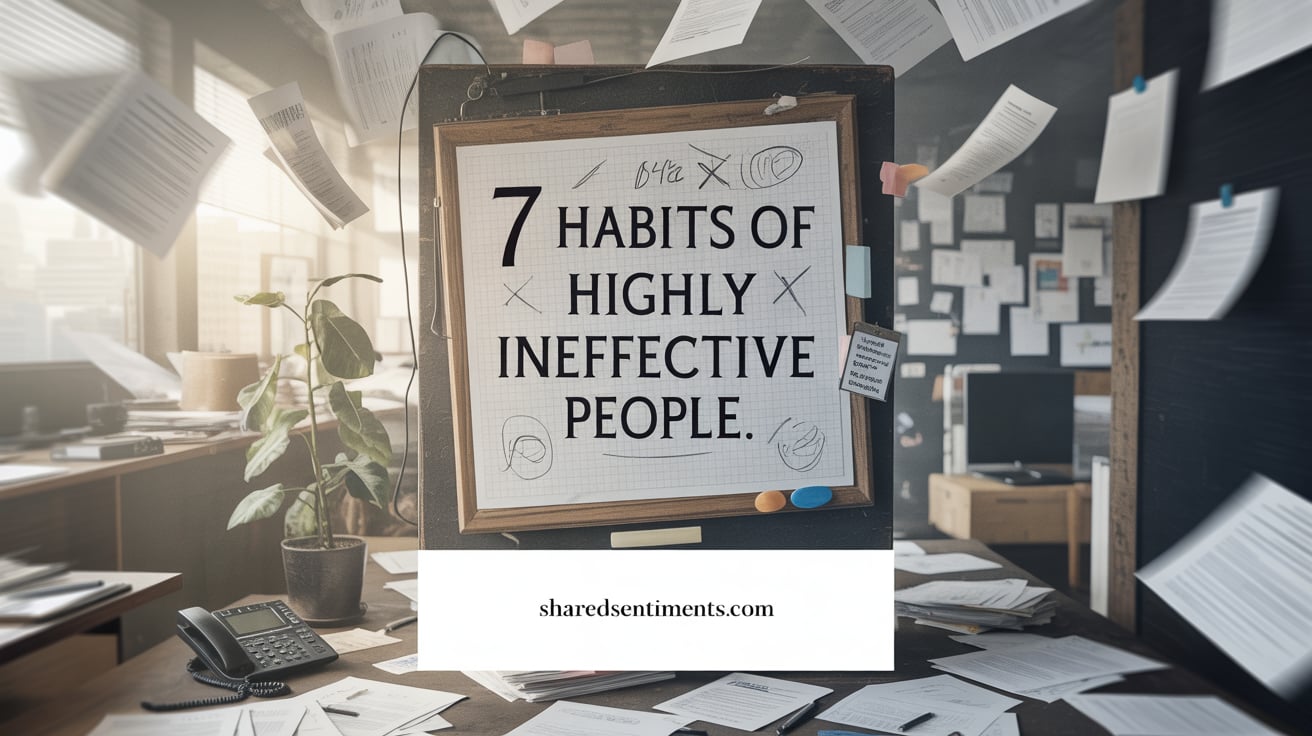7 Habits of Highly Ineffective People

Here’s a different take on habits. Instead of sharing the ones that help you move forward, I want to point out 7 Habits of Highly Ineffective People—the ones you’re better off avoiding.
It’s not only about learning what works. It’s just as important to notice the patterns that hold you back.
The tricky part is that many of these habits slip into daily life without you even realizing it. They feel normal, but they quietly drain your time and energy.
I’ve fallen into all of them at some point. And when I did, I noticed how little progress I made on the things that actually mattered.
To be clear, these are just seven common habits that can make almost anyone ineffective. I’m sure there are plenty more out there, but these are the ones I’ve seen—and struggled with—the most.
Read: How to Improve Your Social Skills
1. Procrastination
I used to think I worked best under pressure.
So I put things off until the last possible moment.
But waiting until the deadline only made me stressed and sloppy.
When I look back at the times I procrastinated, I see missed opportunities and half-finished projects.
Procrastination feels safe in the moment, but it always costs more later.
It robs you of peace of mind and forces you to rush through work that deserves your best effort.
2. Constant Distraction
One of my worst habits was checking my phone every few minutes.
A quick scroll on social media turned into an hour wasted.
It felt harmless, but those little interruptions added up.
Distraction doesn’t just steal your time—it breaks your focus.
Every time I jumped between tasks, I lost momentum and had to start over.
When I look back at the days I gave in to distractions, I realize how little I actually got done.
3. Saying Yes to Everything
For a long time, I thought being helpful meant saying yes to everyone.
Yes to extra projects.
Yes to favors.
Yes to plans I didn’t even want to go to.
But all that yes left me burned out.
I had no time or energy for the things that were most important to me.
When you say yes too often, you end up living on other people’s schedules instead of your own.
I learned the hard way that every yes to someone else is often a no to myself.
4. Overthinking
I can’t count how many times I’ve sat stuck in my own head.
I played out every possible outcome before I took even the smallest step.
Overthinking tricked me into feeling productive when really I wasn’t moving at all.
Instead of acting, I stayed frozen, waiting for the “perfect” moment or the “perfect” plan.
The truth is, no plan is perfect.
And waiting too long usually means missing the chance altogether.
Overthinking is one of the sneakiest habits of ineffective people because it feels like work, but it’s not.
5. Avoiding Responsibility
I used to blame outside factors for my lack of progress.
I’d say I didn’t have enough time, enough support, or enough luck.
Blaming others made me feel better in the short term, but it kept me stuck.
When I avoided responsibility, I avoided growth.
I couldn’t fix what I refused to own.
Taking responsibility is hard, but it’s the only way to change.
Without it, you just spin your wheels and stay in the same place.
6. Poor Time Management
There were days when I worked all day but accomplished almost nothing.
I thought being busy meant being productive.
So I filled my to-do list with tasks that didn’t actually matter.
I spent more time reacting than planning.
By the end of the day, I was tired but not satisfied.
Poor time management wastes more than just hours—it wastes your energy and focus.
Without clear priorities, it’s easy to stay busy while never moving forward.
7. Neglecting Self-Care
This one hit me the hardest.
I used to think that pushing myself nonstop was the way to succeed.
So I skipped breaks, ignored exercise, and stayed up too late.
But neglecting my health always came back to bite me.
I had less energy, less patience, and less creativity.
When I didn’t take care of myself, everything else suffered too.
Being effective isn’t just about work—it’s about keeping your mind and body strong enough to handle it.











